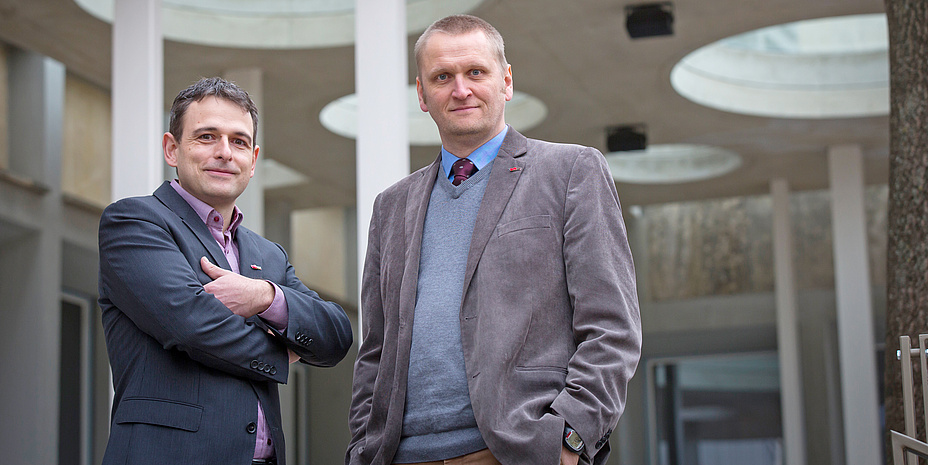“Just like Marcel Hirscher in the Slalom”

But the effort pays off, as Stefan Mangard explains. “Through the basic research made possible in this way we can substantially move our topics forward.” The European Research Council awards various grants, so-called starting grants, to young researchers; to those already anchored in the research community, consolidator grants, while those persons already well-established and acclaimed in the world of science receive advanced grants and, last but not least, those doing research, who have previously received a grant, get a follow-up grant for proof of concept. Back in 2013, Graz University of Technology was happy to receive two starting grants. In 2015 Graz even managed to be awarded two of the renowned and extremely sought-after consolidator grants. After all, they are worth two million euros each, over five years.
FEEL YOUR REACH
Neuroprostheses for paraplegics that can be controlled through thinking – this is the speciality of Gernot Müller-Putz. Currently, via neuroprostheses, simple grasping movements and raising and lowering the lower arm are possible. The purpose of the project FEEL YOUR REACH is to take this one step further to include complex movements sequences in three-dimensional space using the whole arm. Additionally, an artificial feedback system is to be created with whose help patients can learn to feel their movements again. “After all,” says Müller-Putz, “if you can actually feel your movements, you can carry them out better, too.”The topic has accompanied him ever since 1998 when he was asked in a student project to build a robot that could be controlled by thoughts. “I did not have to think about it for long. If I sit here, and I can make something move over there just by my thinking about it, wow, that’s amazing,” he explains in his bright office in the building of Biomedical Engineering at TU Graz. But the medical side, too, plays a role here. “Paraplegics used to be told that their condition cannot be changed. Now, the question is if that is necessarily really so.”
SOPHIA
Stefan Mangard’s field of research is located somewhere totally different, and not only locally. His office is at the TU Graz Inffeldgasse Campus. Stefan Mangard explores the security of computer systems and, at the moment, attacks which use the physical characteristics of the hardware in order to be able to access confidential data. “This can be done, for instance, by measuring the electricity consumption, observing the run-time behaviour, or surveying the electro-magnetic radiation,” the researcher explains. Another possibility is to interfere in the processor’s work externally, i.e. by raising the temperature or changing the voltage until the PC starts to make small errors. Such small mistakes as, for instance, a single memory location performing bit flips, may have a fatal impact on security. “For instance, the most trivial error is a bit error which accepts a wrong password entry as correct.”At the moment, scientists are mainly dealing with coding systems to protect PCs against such hardware attacks. “Surprisingly, not so much attention is paid to the processors themselves although this is where all the sensitive data gets processed.” The objectives of the project aim high. “By the fifth project year I hope to have built a complete processor system in terms of a chip prototype which is really secure.” Later on, the technology behind it should be freely available and be able to be further developed in the research community. With the help of an ERC grant, you have the opportunity to create a real momentum, and this is exactly what I want to do.”
Kontakt
Gernot MÜLLER-PUTZ
Univ.-Prof. Dipl.-Ing. Dr.techn.
Institute of Neural Engineering
Stremayrgasse 16/IV
8010 Graz
Tel.: +43 316 873 30700
Fax: +43 316 873 1030700
<link int-link-mail window for sending>gernot.mueller@tugraz.at
<link http: bci.tugraz.at mueller _blank int-link-external external link in new>bci.tugraz.at/mueller
Stefan MANGARD
Univ.-Prof. Dipl.-Ing. Dr.techn.
Applied Information Processing and Communications
Inffeldgasse 16a
8010 Graz
Tel.: +43 316 873 5531
Fax: +43 316 873 105531
<link int-link-mail external link in new>stefan.mangard@iaik.tugraz.at
<link http: www.iaik.tugraz.at mangard _blank int-link-external external link in new>www.iaik.tugraz.at/mangard



